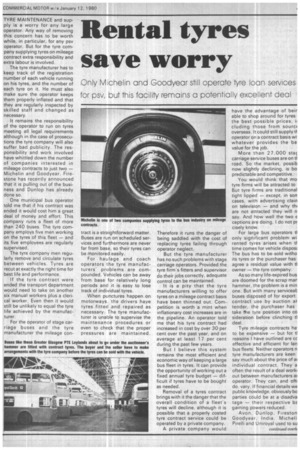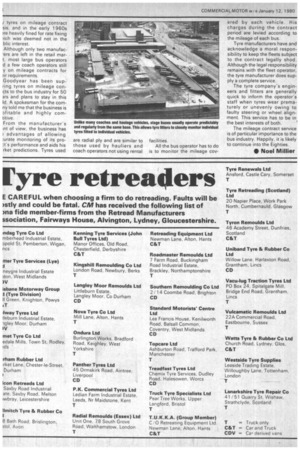Rental tyres save worry
Page 49

Page 50

If you've noticed an error in this article please click here to report it so we can fix it.
TYRE MAINTENANCE and supply is a worry for any large operator. Any way of removing this concern has to be worth while, in particular, for any psv operator. But for the tyre company supplying tyres on mileage contract extra responsibility and extra labour is involved.
The tyre manufacturer has to keep track of the registration number of each vehicle running on his tyres, and the number of each tyre on it. He must also make sure the operator keeps them properly inflated and that they are regularly inspected by skilled staff and changed as necessary.
It remains the responsibility of the operator to run on tyres meeting all legal requirements although in the case of prosecutions the tyre company will also suffer bad publicity. The responsibility and work involved have whittled down the number of companies interested in mileage contracts to just two — Michelin and Goodyear. Firestone has recently announced that it is pulling out of the business and Dunlop has already done so.
One municipal bus operator told me that if his contract was ended it would cost him a great deal of money and effort. This company runs a fleet of more than 240 buses. The tyre company employs five men working on the tyres of this fleet — and its five employees are regularly supervised.
The tyre company men regularly remove and circulate tyres between vehicles. Tyres are recut at exactly the right time for best life and performance.
If the tyre contract were ended the transport department would need to take on another six manual workers plus a clerical worker. Even then it would still be unlikely to equal the tyre life achieved by the manufacturer.
For the operator of stage carriage buses and the tyre manufacturer the mileage con
tract is a straightforward matter. Buses are run on scheduled services and furthermore are never far from base, so their tyres can be monitored easily.
For haulage and coach operators the tyre manufacturers' problems are compounded. Vehicles can be away from base for relatively long periods and it is easy to lose track of individual tyres, When punctures happen on motorways, the drivers have tyres fitted and repaired as necessary. The tyre manufacturer is unable to supervise the maintenance procedures or even to check that the proper pressures are maintained. Therefore it runs the danger of being saddled with the cost of replacing tyres failing through operator neglect.
But the tyre manufacturer has no such problems with stage carriage operators. Provided the tyre firm's fitters and supervisor do their jobs correctly, adequate control can be maintained.
It is a pity that the tyre manufacturers willing to offer tyres on a mileage contract basis have been thinned out. Competition is worth a mint when inflationary cost increases are in the pipeline. An operator told me that his tyre contract had increased in cost by over 30 per cent over the past year, and on average at least 17 per cent during the past few years.
But I believe this system remains the most efficient and economic way of keeping a large bus fleet in tyres. It can provide the opportunity of working out a fixed annual tyre budget — difficult if tyres have to be bought as needed.
Removal of a tyres contract brings with it the danger that the overall condition of a fleet's tyres will decline, although it is possible that a properly costed tyre contract service could be operated by a private company.
A private company would have the advantage of beir able to shop around for tyres the best possible prices, ii cluding those from sourcf overseas. It could still supply tf operator on a contract basis wr whatever provides the be value for the job.
More than 27,000 sta.c carriage service buses are on tl road. So the market, possib now slightly declining, is ho predictable and competitive.
You would think that mo tyre firms will be attracted to But tyre firms are traditional tight lipped — except, in sorr cases, with advertising clain on television — and why th, are not attracted they will n say. And how well the two e ceptions are doing, I do not pi cisely know.
For large bus operators ti only significant problem wi rented tyres arises when ti time comes for vehicle disposi. The bus has to be sold witho its tyres or the purchaser has agree a residual value with ti owner — the tyre company.
As so many life-expired bus are doomed for the scrap mar hammer, the problem is a min one. But with many serviceab buses disposed of for export contract use by auction ar tender, the purchaser has take the tyre position into co sideration before clinching ti deal.
Tyre mileage contracts ha' to be expensive — but for tl reasons I have outlined are cc effective and efficient for lar bus fleets. Neither operators n tyre manufacturers are keen say much about the price of ai individual contract. They a often the result of a deal work, out between manufacturers ar operator. They can, and oft do, vary. If financial details we public knowledge, obviously be parties could be at a disadva tage — their respective be gaining powers reduced,
Avon, Dunlop, Fireston Goodyear, India. Micheli Pirelli and Uniroyal used to su continued oveth / tyres on mileage contract sis, and in the early 1960s !re heavily fined for rate fixing iich was deemed not in the blic interest.
Although only two manufac-ers are left in the retail mart, most large bus operators d a few coach operators still y on mileage contracts for ir requirements.
Goodyear has been supfing tyres on mileage concts to the bus industry for 50 3rs and plans to stay in this Id. A spokesman for the cornfly told me that the business is Dfitable and highly corntitive.
From the manufacturer's ,nt of view, the business has ! advantages of allowing :urate monitoring of its pron's performance and aids his rket predictions. Tyres used are radial ply and are similar to those used by hauliers and coach operators not using rental facilities.
All the bus operator has to do is to monitor the mileage coy
ered by each vehicle. His charges during the contract period are levied according to the mileage of each bus.
Tyre manufacturers have and acknowledge a moral responsibility to keep the fleets subject to the contract legally shod. Although the legal responsibility remains with the fleet operator, the tyre manufacturer does supply a complete service.
The tyre company's engineers and fitters are generally quick to inform the operator's staff when tyres wear prematurely or unevenly owing to faulty steering or wheel alignment. This service has to be in the best interests of both.
The mileage contract service is of particular importance to the bus industry. Happily, it is likely to continue into the Eighties.
• Noel Millier












































































































